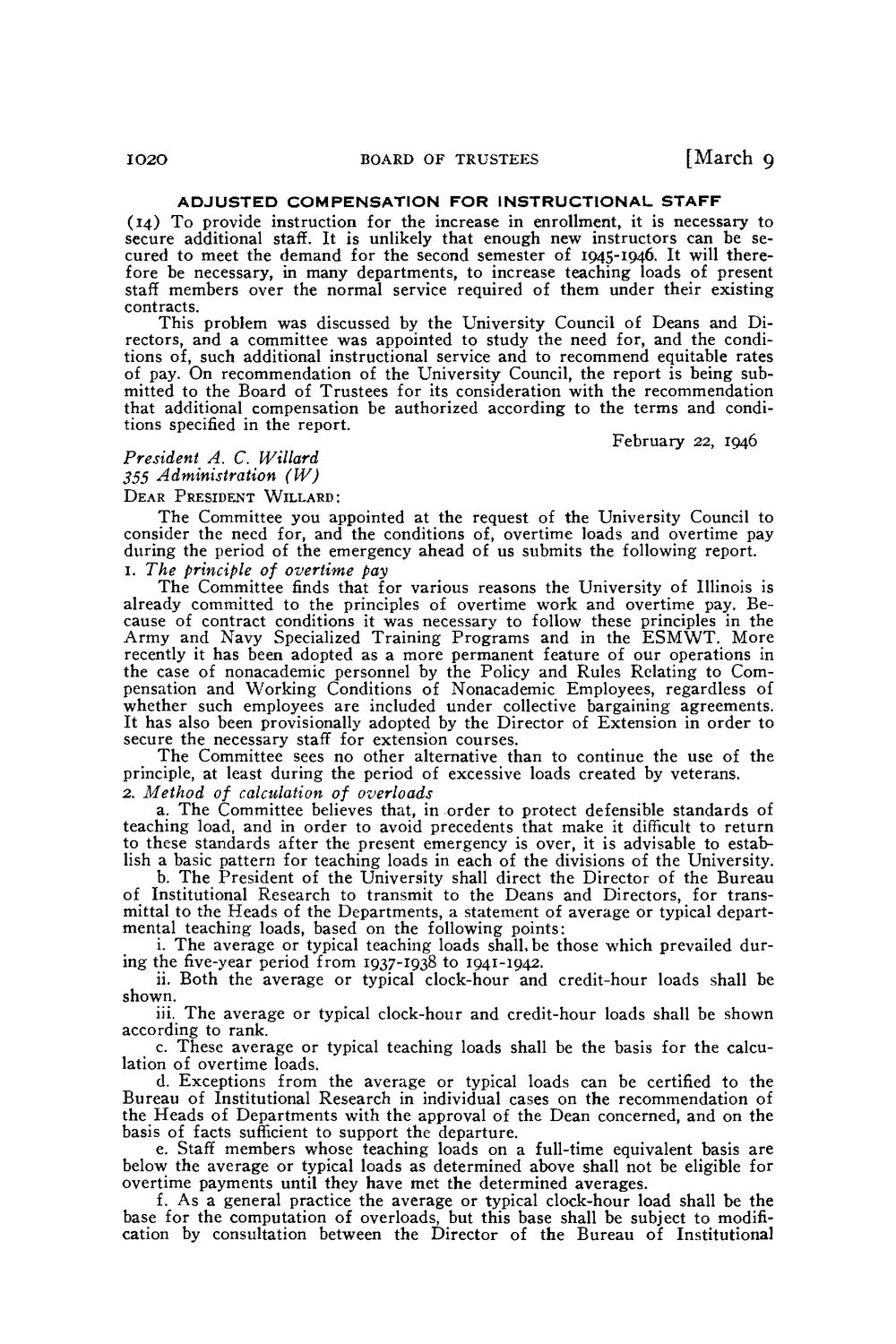| |
| |
Caption: Board of Trustees Minutes - 1946
This is a reduced-resolution page image for fast online browsing.

EXTRACTED TEXT FROM PAGE:
1020 BOARD OF TRUSTEES [March 9 ADJUSTED COMPENSATION FOR INSTRUCTIONAL STAFF (14) T o provide instruction for the increase in enrollment, it is necessary to secure additional staff. It is unlikely that enough new instructors can be secured to meet the demand for the second semester of 1045-1046. It will therefore be necessary, in many departments, to increase teaching loads of present staff members over the normal service required of them under their existing contracts. This problem was discussed by the University Council of Deans and Directors, and a committee was appointed to study the need for, and the conditions of, such additional instructional service and to recommend equitable rates of pay. On recommendation of the University Council, the report is being submitted to the Board of Trustees for its consideration with the recommendation that additional compensation be authorized according to the terms and conditions specified in the report. February 22, 1046 President A. C. Willard S55 Administration (IV) DEAR PRESIDENT W I L L A R D : T h e Committee you appointed at the request of the University Council to consider the need for, and the conditions of, overtime loads and overtime pay during the period of the emergency ahead of us submits the following report. 1. The principle of overtime pay T h e Committee finds that for various reasons the University of Illinois is already committed to the principles of overtime work and overtime pay. Because of contract conditions it was necessary to follow these principles in the Army and Navy Specialized Training P r o g r a m s and in the E S M W T . More recently it has been adopted as a more permanent feature of our operations in the case of nonacademic personnel by the Policy and Rules Relating to Compensation and Working Conditions of Nonacademic Employees, regardless of whether such employees are included under collective bargaining agreements. It has also been provisionally adopted by the Director of Extension in order to secure the necessary staff for extension courses. T h e Committee sees no other alternative than to continue the use of the principle, at least during the period of excessive loads created by veterans. 2. Method of calculation of overloads a. T h e Committee believes that, in order to protect defensible standards of teaching load, and in order to avoid precedents that make it difficult to return to these standards after the present emergency is over, it is advisable to establish a basic pattern for teaching loads in each of the divisions of the University. b. T h e President of the University shall direct the Director of the Bureau of Institutional Research to transmit to the Deans and Directors, for transmittal to the Heads of the Departments, a statement of average or typical departmental teaching loads, based on the following points: i. The average or typical teaching loads shall.be those which prevailed during the five-year period from 1937-1938 to 1941-1942. ii. Both the average or typical clock-hour and credit-hour loads shall be shown. iii. T h e average or typical clock-hour and credit-hour loads shall be shown according to rank. c. These average or typical teaching loads shall be the basis for the calculation of overtime loads. d. Exceptions from the average or typical loads can be certified to the Bureau of Institutional Research in individual cases on the recommendation of the Heads of Departments with the approval of the Dean concerned, and on the basis of facts sufficient to support the departure. e. Staff members whose teaching loads on a full-time equivalent basis are below the average or typical loads as determined above shall not be eligible for overtime payments until they have met the determined averages. f. As a general practice the average or typical clock-hour load shall be the base for the computation of overloads, but this base shall be subject to modification by consultation between the Director of the Bureau of Institutional
| |